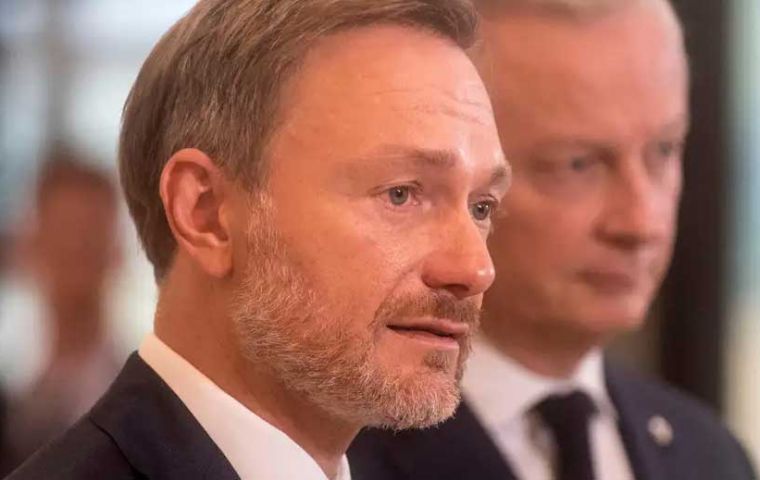MercoPress. South Atlantic News Agency
European Union agrees on new spending rules, but to be implemented in 2025
 The Franco-German proposal that Lindner and his French counterpart Bruno Le Maire agreed took place on Tuesday evening
The Franco-German proposal that Lindner and his French counterpart Bruno Le Maire agreed took place on Tuesday evening Following an agreement between heavyweights Germany and France, the European Union has anticipated lower budget deficits and falling debt ratios to boost investment. The decision was praised by the northern EU austerity members and also by the southern countries, normally more lenient on spending.
“I am happy that after a long discussion and tough negotiations, we have now reached a good agreement on the EU's fiscal rules,” Dutch finance minister Sigrid Kaag said after Finance ministers held a two-hour video meeting.
However plans still have to be adopted by the countries and negotiated with the European Parliament.
The new fiscal rules are both more realistic and more effective, German Finance Minister Christian Linder wrote in a post on X. “They combine clear figures for lower deficits and falling debt ratios with incentives for investment and structural reform,” he said, adding that it would strengthen stability in the bloc.
The Franco-German proposal that Lindner and his French counterpart Bruno Le Maire agreed took place on Tuesday evening. The agreement will have no impact on the EU members' fiscal policy in 2024 because national budgets for next year have already been decided on the basis of guidelines agreed earlier in 2023.
The deal is the fourth reform of the EU's fiscal rules, known as the Stability and Growth Pact, which is designed to underpin the value of the EU's single currency, the Euro, by limiting government borrowing.
This is with a view to prevent national debt difficulties, and resulting pressure on the Euro currency, such as those experienced in the aftermath of the financial crisis in countries like Greece, Spain, Italy and Portugal.
The pact was designed to provide some shared standards on domestic fiscal policy in the EU sets nominal limits of 3% of GDP for annual government deficits and 60% of GDP for overall public debt. But Covid and the Russia/Ukraine war has left almost every EU member in breach of its own targets and prompted calls for reforms that would set a more realistic path back towards the desired benchmarks.




Top Comments
Disclaimer & comment rulesCommenting for this story is now closed.
If you have a Facebook account, become a fan and comment on our Facebook Page!